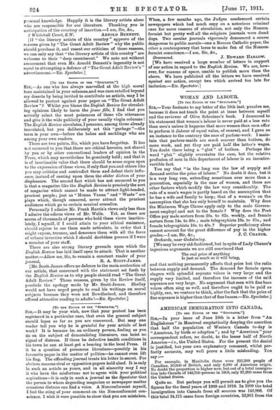WOMAN AND LABOUR.
[To THE EDITOR OF THE "SPECTATOR."] SIR,—Your footnote to my letter of the 10th inst. puzzles me, because it does not touch the point at issue between myself and the reviewer of Olive Schreiner's book. I demurred to his statement that women's labour is never paid at a less rate than men's unless it happens that more women than men offer to perform it {labour of equal value, of course), and I gave as an instance to the contrary the case of parlour-work. I main- tain that parlour-maids are much scarcer than butlers, do more work, and yet they are paid half the latter's wages. You doubt there being a " glut " of butlers. Perhaps the word " glut " slightly overstates the case, but the relative profusion of men in this department of labour is an incontro- vertible fact.
You say that " in the long run the law of supply and demand settles the price of labour." No doubt it does, but it is a very long run, extending sometimes over more than a generation, especially in the case of women, and there are other factors which modify the law very considerably. The rate of a man's wages is partly based on the assumption that he has a wife and family to keep; that of a woman's on the assumption that she has only herself to maintain. Why does the Minimum Wage Clause apply only to the male Govern- ment employe and not to the female ? Why does the Post Office pay male sorters from 20s. to 62s. weekly, and female sorters from 14s. to 30s. ; male telegraphists 18s. to 65s., and female telegraphists 16s. to 40s. ? Superior proficiency alone cannot account for the great difference of pay in the higher [We may be very old-fashioned, but in spite of Lady Chance's ingenious arguments we are still convinced that
The real price of anything Is just as much as it will bring,
and that nothing permanently affects that price but the ratio between supply and demand. The demand for female opera singers with splendid soprano voices is very large and the supply very limited, and therefore the incomes of the said sopranos are very large. No argument that men with fine bass voices often sing as well, and therefore ought to be paid as highly, can, we venture to think, alter the fact that the price of fine sopranos is higher than that of fine basses.—En. Spectator.]










































 Previous page
Previous page